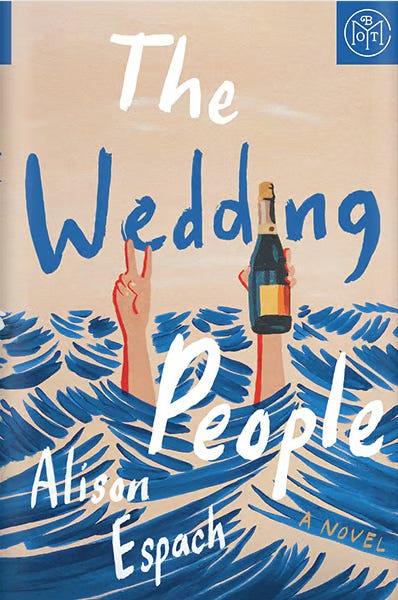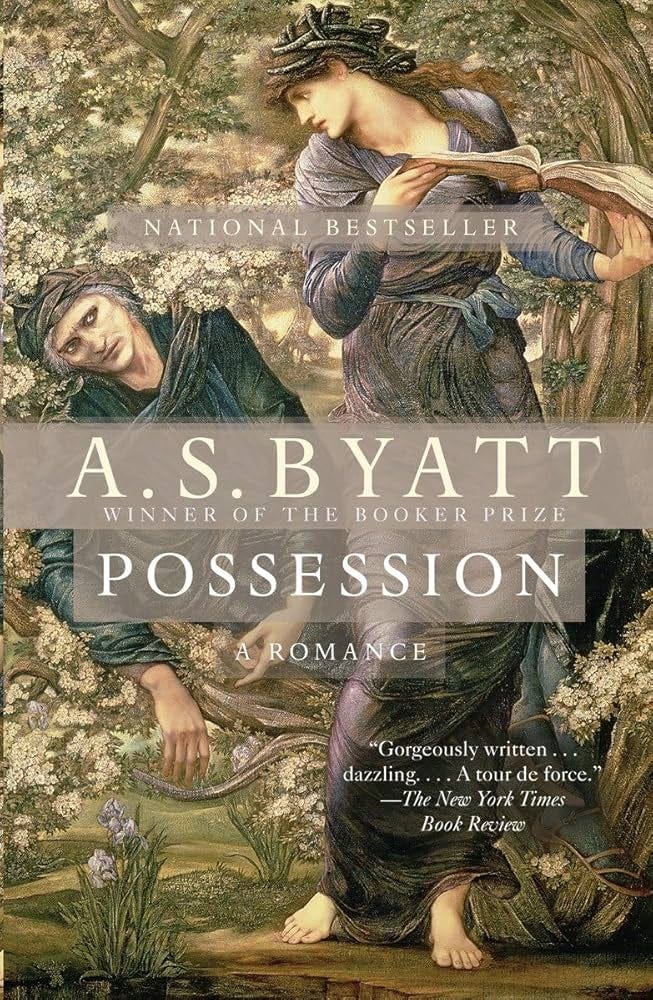This past week, I read two fun, fast-paced books and tackled a longer novel that has been on my list for a while now — Possession: A Romance (which was adapted into a movie with Gwyneth Paltrow in the early 2000s). I will discuss the quicker reads first and then dive into Possession. Let’s get into it.
What I read:
The Wedding People by Alison Espach
The Wedding People takes place over the course of a week in Newport, Rhode Island. It opens with the lead character, Phoebe Stone, dressed in a green cocktail dress and arriving with no bags at a (fictional) luxury hotel called the Cornwall Inn. Everyone else is there for a wedding, and the hotel staff immediately mistake Phoebe for one of “the wedding people.” After checking in, she meets the bride, Lila, who has planned an elaborate six-day wedding that is too big to fail.
Espach reveals in the first ten or so pages that Phoebe, a professor from St. Louis with a doctorate in Victorian literature, is struggling mentally after a divorce. She booked this trip after seeing the Cornwall Inn in a magazine and plans to die at the hotel. But Phoebe quickly gets tangled up with the complicated personalities of the wedding people and surprisingly connects with them.
Despite the dark premise, this book is quite uplifting and funny. It is filled with high-end wedding drama and sharp social commentary about the upper class. But The Wedding People also has a lot of heart — it is ultimately a story about a woman turning her life around. It reminded me of a mix of Matt Haig’s The Midnight Library (the depression themes) and Jenny Jackson’s Pineapple Street (in terms of the cultural commentary and writing style).
Overall, I really enjoyed this book, even if it was somewhat predictable, and I definitely recommend it!
Rating: 3.8/5
Genre: Contemporary Fiction
Notable prizes/book clubs/lists: Read with Jenna
Page count: 384 pages
Audio: 11 hours and 37 minutes
Food/drink pairings: Chocolate wine
Margo’s Got Money Troubles by Rufi Thorpe
Margo’s Got Money Troubles is set in Fullerton, California. When we meet the twenty-year-old protagonist, Margo Millet, she is pregnant and has just dropped out of junior college after having a brief affair with her thirty-seven-year-old married English professor. Wanting nothing to do with Margo or the baby, the professor gives her a meager lump sum payment and makes her sign a non-disclosure agreement.
While the money gives her some breathing room after her son, Bodhi, is born, Margo cannot support her new family with her waitressing job. Her mother, Shyanne, a former Hooters waitress who now works at Bloomingdales, refuses to help. Margo occupies “the echoey space of no one caring about her or worrying about her or helping her.”
But then her estranged father, Jinx, a former WWE Hall of Fame wrestler, appears at her doorstep. Although he is recovering from an opioid addiction, Jinx is a competent babysitter and moves in to help with Bodhi. While this solves her childcare needs, Margo still needs money and ends up starting an OnlyFans account. Jinx is initially judgmental but eventually offers Margo marketing and financial advice (it turns out pro wrestling strategies translate well here).
When I tried to describe this book to my friend, I got lost in the absurd details—OnlyFans, TikTok, pro wrestling, Hooters, methadone. Margo’s Got Money Troubles sounds like a lot, but beneath this unconventional plot is a story about what love is and who deserves love and a good life. It is also well-written; Thorpe alternates between third-person and first-person narration and occasionally breaks the fourth wall by addressing the reader directly. This structure plays with the idea of what art is and who it is for.
I definitely recommend this unconventional book. The characters are realistic and endearing, and Thorpe’s writing is darkly funny.
Rating: 3.8/5
Genre: Contemporary Fiction (Messy Women)
Page count: 304 pages
Audio: 10 hours and 21 minutes (narrated well by Elle Fanning)
Movie/TV pairings: Apple has already optioned this book with Elle Fanning, Nicole Kidman, and Michell Pfeiffer set to star in it.
Food pairings: Arby’s
Possession: A Romance by A.S. Byatt
While the title is Possession: A Romance, this book straddles several genres. It is part academic satire, mystery thriller, Victorian love story, and even a bit of fantasy. Possession is told from alternating points of view in two timelines: the late 1980s and Victorian England.
The novel opens in 1986 with struggling academic Roland Mitchell researching his literary hero, Randolph Henry Ash (who is fictional but mostly based on Robert Browning), in the Reading Room of the London Library. He discovers two drafts of letters addressed to an unidentified woman in Ash’s handwriting. The letters indicate that the supposedly happily married poet had a clandestine love affair.
After some literary detective work, Roland discovers that the woman in question was the Victorian poet Christabel LaMotte (also fictional but seems to be based on Emily Dickinson and Christina Rossetti). Roland reaches out to Maud Bailey, a feminist academic and leading LaMotte scholar. They work to piece together this mystery through England’s archives and country homes and begin to fall for each other. As their story unfolds, Byatt also brings Ash and LaMotte’s affair to life through a collection of letters, poems, critical writing, and journal entries.
The pace intensifies in both timelines as the novel progresses. The romance between LaMotte and Ash becomes increasingly torrid. In the modern story, more established academics begin pursuing the Ash-LaMotte story and follow Maud and Roland like literary villains. The last part of Possession reads almost like a suspense novel (interlaced with Victorian poetry).
Possession is impressively well-written and structured. Byatt has included 1,700 lines of original poetry and more than 100 pages of the invented journal extracts of about a dozen characters. She elegantly weaves the storylines together through clever allusions and keywords. The plotlines give new meaning to the works of Ash and LaMotte; clearly, the two love affairs mirror each other. Byatt also plays with the narrative structure and alternates points of view; she uses an omniscient narrator sparingly to tell the reader what historians and academics did not know.
As the title suggests, Byatt explores possession in various forms. After finishing Possession, I read that Byatt was inspired to write this after watching a Samuel Taylor Coleridge scholar in the British Museum Library. She commented, “I thought, it’s almost like a case of demonic possession, and I wondered — has she eaten up his life or has he eaten up hers?” She explores the biographer-subject relationship that can become a type of literary grave-robbing. In the book, Byatt mentions the “vultures” who rifled through the desk of Charles Dickens after his death and discusses how George Eliot had her most personal letters buried with her. The characters also wrestle with ownership and independence in the context of their romantic relationships.
While this book is dense with themes and allusions, it is also an entertaining adventure love story — the last 100 pages completely engrossed me. However, I might hesitate to recommend this to a friend. Possession is somewhat esoteric, and you must enjoy Victorian poetry and writing to like this. Even in the 1980s storyline, Byatt’s writing style is ornate and filled with long digressions. For instance, Byatt takes a page or so to describe Roland photocopying a document: “In the dim and hum of the extractor fan, he took out the two letters and read them again. Then he spread them face down, to be scryed on the black glass . . .” I happen to love that type of writing when it is executed well, as it is here, but I see how this writing style is not for everyone. Basically, if you love a literary puzzle and Victorian writing, you should read this!
Rating: 4/5
Genre: Historical Fiction
Notable prizes/book clubs/lists: Booker Prize (1990)
Page count: 517 pages
Audio: 22 hours and 18 minutes (But I would not recommend trying this on audio — it is an older recording, and it is hard to distinguish who is speaking.)
Movie/TV pairings: In 2002, this book was adapted into a movie starring Gwyneth Paltrow and Aaron Eckhart. Here is a link to the movie trailer.
Articles I cannot stop thinking about:
“Russian Missiles, American Chips” in Bloomberg
Silicon chips have extremely complex supply chains. This article concerns supply chains gone awry — American chips guided Russian missiles in an explosion in 2023 in Ukraine:
One fragment that survived the explosion was a forest-green metal board dotted with chips the size of a baby’s fingernails inside squares with yellow borders. Vysikan pulls out a magnifying glass to read the tiny print etched into two of the semiconductors. It shows they were made by Silicon Laboratories Inc., a company based in Austin. Numbers on the chips show they were produced in the third week of January and the first week of March 2022. It takes months for semiconductors to snake their way through the global supply chain, making it likely Russia imported them after Western export controls were in place.
If you are interested in the history and development of silicon chips, I highly recommend Chris Miller’s Chip War.
“The Elite College Students Who Can’t Read Books” from The Atlantic
“Many students no longer arrive at college—even at highly selective, elite colleges—prepared to read books.” A Columbia student said that in high school, “She had been assigned excerpts, poetry, and news articles, but not a single book cover to cover.”
What I am cooking:
Cucumber salad and pan-seared tuna
Pan-seared tuna with avocado, soy, ginger, and lime: This tuna recipe is incredibly easy and quick. This sauce would also work well with other fish or tofu dishes.
Samin Nosrat’s Vietnamese cucumber salad: Also easy!










